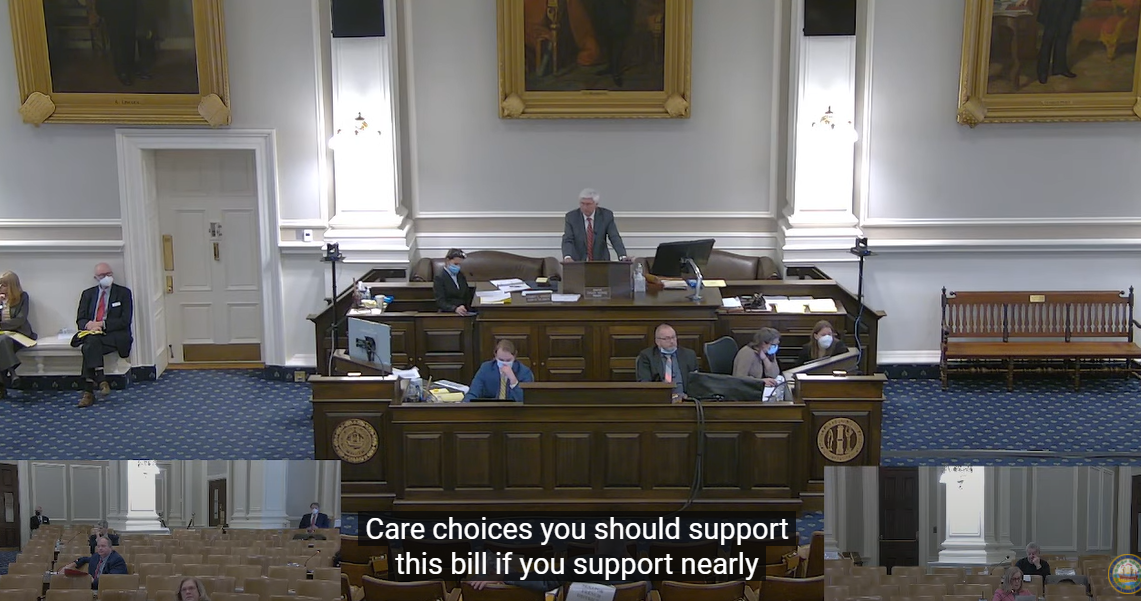By PAULA TRACY, InDepthNH.org
CONCORD – On Thursday, Senate Republicans voted to repeal the state’s new law mandating ultrasounds for abortion but preserved the remaining provisions of a new state law that bans abortion after 24 weeks gestation without exceptions for rape, incest, or fatal fetal diagnoses.
Senate Bill 399 now goes to the House. Republican Gov. Chris Sununu has said he would like to see the ultrasound provision removed and also wants to decriminalize doctors who perform abortions after 24 weeks, as is included in the new law.
Senate Bill 436, a separate bill to codify Roe v. Wade into state law that would not have impacted the state’s abortion ban, was tabled after an “Inexpedient to Legislate” motion failed, 12-12. Republican Senators Jeb Bradley, Wolfeboro, and Erin Hennessey, Littleton, joined Senate Democrats in that vote.
Sen. Sharon Carson, R-Londonderry, sponsored the floor amendment narrowing the scope of SB 399 to focus solely on clarifying the ultrasound provision. She said the amendment came after a long discussion and listening to New Hampshire following last year’s decision.
She said it was a “misconception” that the initial intent that the ultrasound requirement would be in early pregnancy before termination could be allowed and she said the amendment would not require an ultrasound if the health care provider knows that the fetus is at least 24 weeks in gestation or is conscious of a substantial risk to that effect.
She called it a “moderate and common-sense law.”
Democrats in the Senate offered a series of floor amendments to seek further narrowing of the state abortion ban, including exceptions for rape, incest, and fatal fetal diagnoses as well as a removal of criminal penalties for medical providers. All four floor amendments failed.
In response to one such amendment offered by Sen. Becky Whitley, D-Hopkinton, Carson stated that she had a problem with the termination of nonviable fetuses after 24 weeks, where there may be a health decision.
She said the disabled give us “so much…They are not an impediment, something to get rid of,” and she said she spoke as the mother of a disabled adult.
But Sen. Thomas Sherman, D-Rye, a physician, said there seemed to be some confusion between a disability and the survivability of a fetus.
“What Sen. Whitely is talking about is a fetus that is not viable, not disabled,” he clarified.
He said carrying a not viable fetus to term puts the mother at health risk and could result in her death and the continued suffering of the fetus.
“This addresses extreme anomalies,” he stressed.
The amendment was defeated 13-11 with Republican Sen. Hennessey voting with the Democrats.
Another amendment to eliminate the criminal penalties for doctors who perform such abortions and make them liable for seven years in prison failed as well even though senators were told the state has lost 10 birthing units in recent years with fewer obstetricians and gynecologists attracted to working in the state, even before this prohibition.
This only furthers the problem of attracting obstetrical services, said Sen. Suzanne Prentiss, D-Lebanon.
It failed 10-14 on partisan lines.
Sen. Donna Soucy, D-Manchester, also offered an amendment for consideration of abortions after 24 weeks for victims of rape or incest.
“We need to remember 41 percent of reported sex assaults in New Hampshire happened under the age of 18,” she said noting that they are some of our most vulnerable citizens.
“She may not be able to get away,” in 24 weeks, from her perpetrator, she noted,
Sen. William Gannon, R-Sandown, asked if her amendment would allow for “a healthy viable baby could be aborted right up to birth?”
Soucy responded that the measure would provide the opportunity for women and children who have been violently attacked to get the health care that they want and need.
Sen. David Watters, D-Dover, said while some might think this is an improvement to current law, it does not address underlying assault to medical freedom. He noted his grandmother had to carry a dead fetus to term and this bill would only tell her she can get an ultrasound but still would have to carry that pregnancy to term.
He charged those who were reversing their vote from last June on the measure to ask themselves if their votes were based on political expediency or their moral and religious views.
Carson rose to remind senators why the amendment was made and said she disagreed with the “political expediency” argument.
“It’s not political to listen to people. …to represent people. We discussed at length the..issue of ultrasounds and we defended that position…because we wanted to make sure that the fetus was of a certain age,” Carson said of last June’s vote.
“But we listened to the people of the state of New Hampshire who were not happy with this issue…the providers…the arguments about the government coming in between a woman and her health care provider and we said ‘okay’ we will leave it up to the doctor,” she said.
Carson said this is a change in the law “based on listening. We represent the people, we heard the people and the committee supported it.”





